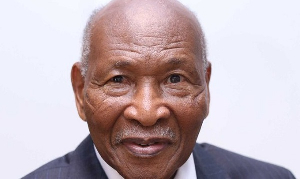Opinions of Wednesday, 27 September 2023
Columnist: Evans Mawunyo Tsikata
Beyond scandals: Analyzing the deep-seated issues of Ghana's endemic kleptocracy
Ghana is a country with limitless potential, with abundant natural resources and a lively culture. However, the country's endemic kleptocracy has hampered its progress, as unscrupulous officials have siphoned off development funding, leaving inhabitants struggling to make ends meet.
Over the years, kleptocracy has been a distinguishing aspect of Ghana's political scene. Corruption has invaded every institution, from the highest levels of government to the lowest ranks of public workers, causing incalculable damage to the country's economy and prestige. While not unique to Ghana, this phenomenon has produced an atmosphere in which individuals in authority use their positions for personal wealth, putting the country's most vulnerable citizens at a disadvantage.
Kleptocracy is a corrupt regime in which leaders utilize their authority to steal and embezzle resources from within their own country. For many years, Ghana has been plagued by rampant issues of corruption, with government officials and politicians enriching themselves at the expense of the country and its inhabitants. This canker has infected all regimes in Ghana's fourth republic. The worry is about what will happen to our generation and future generations. The absence of accountability and transparency in Ghana's government institutions is one of the primary causes of this widespread kleptocracy.
Ghana's authorities have failed to enact and enforce strict laws and regulations that promote transparency and accountability among public officials. As a result, politicians and government officials are rarely held accountable for their activities, and individuals participating in corrupt tactics face little to no legal ramifications.
Nepotism and cronyism are two more major contributors to corrupt practices in Ghana. Politicians and government officials sometimes appoint family members and close friends to positions of power, regardless of their qualifications or merit. These inexperienced appointees then utilize their positions to siphon off government resources for personal benefit, adding to the country's endemic kleptocracy.
Furthermore, Ghana's justice system contributes greatly to corruption due to its weak and underfunded structure. A lack of resources and funding impedes the judiciary's ability to appropriately investigate and punish corruption charges. The legal system may lack the resources, technology, and personnel required to gather evidence and build compelling cases against corrupt individuals due to a lack of financial support. Low salaries and inadequate compensation for judges and other judicial staff foster an environment ripe for bribery and undue influence, endangering the integrity and impartiality of the judicial process.
Furthermore, the lack of independence and political meddling in the court system permits those accused of corruption to exert influence over the courts, resulting in biased decisions and the manipulation of legal processes.
Addressing these challenges is critical for eliminating corruption and promoting the rule of law in Ghana.
It is also crucial to note that kleptocracy has an impact on Ghana that extends beyond economics. The divergence of funds and resources from development projects and public services has resulted in a scarcity of critical infrastructure, particularly in rural areas, such as dependable electricity, safe drinking water, and adequate healthcare. This exacerbates the hardships of the country's citizens, particularly those living in poverty.
This concern has also eroded popular confidence in the government and its institutions. Many Ghanaians have lost faith in the political system and their leaders' ability to address their concerns and demands. This lack of trust in the government undermines social cohesiveness and has the potential to lead to social unrest and political instability.
The world community has taken notice of Ghana's kleptocracy problem. The image of the country has deteriorated, making it less enticing to overseas investors and inhibiting economic growth. Furthermore, Ghana's high levels of corruption have resulted in a loss of foreign aid and investment, since donors and investors are hesitant to support a country with such a deeply ingrained kleptocratic system.
Combating this problem in Ghana necessitates a multifaceted approach. Institutional reforms that promote transparency, accountability, and meritocracy must be prioritized by the government. This involves bolstering anti-corruption agencies, imposing harsher financial constraints, and establishing independent oversight systems. Furthermore, education and awareness activities should be focused on developing a culture of integrity and ethical behavior among public officials.
International assistance and cooperation are also essential in Ghana's fight against kleptocracy. The foreign community may provide technical aid, financial resources, and expertise to Ghana's institutions and anti-corruption efforts. Ghana can overcome its kleptocracy problem and realize its genuine potential for the benefit of its citizens and future generations by working together.
In conclusion, lack of transparency, accountability, nepotism, and cronyism have all contributed to the government's persistent kleptocracy. Unless and until these concerns are addressed and resolved, Ghana's government officials and politicians are unlikely to put the well-being of the country and its citizens over their own.
Kleptocracy has permeated Ghanaian politics, hampering the country's progress. To tackle corruption, the government must take bold measures such as improving transparency, establishing accountability systems, and enforcing sanctions. Ghana's future is in doubt until its leaders prioritize transformation before personal gain.













